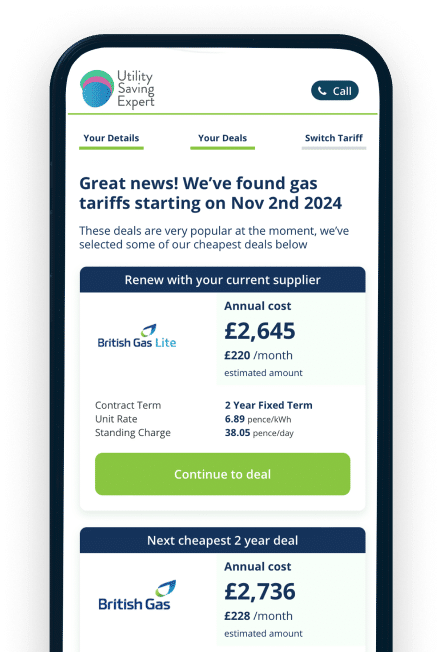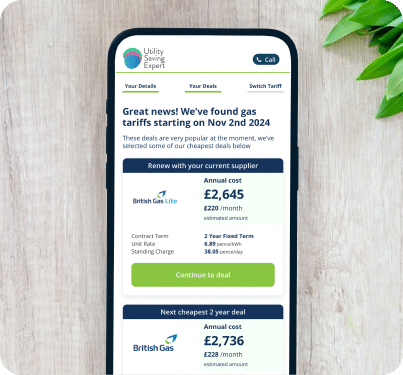
Business Gas Comparison
Compare Business Gas Prices, Suppliers & kWh Rates
We work with a panel of trusted business energy suppliers, so you can switch with confidence.
Compare Today's Rates
How To Compare Business Gas Rates & Switch Suppliers
Follow these four simple steps to switch business gas suppliers with Utility Saving Expert today:
Enter your business postcode details on our form. If you need help, call our energy experts on 01242 32 31 31.
We’ll provide you with a list of business gas quotes and tariffs that fit your needs.
Compare the different business energy contracts and choose the one you like. Your new supplier will handle the switch on your behalf.
Your switch will be complete within four to six weeks. Sit back and enjoy the savings on your next energy bill.
What Makes Our Business Gas Price Comparison Tool Stand Out?
Utility Saving Expert’s comparison tool makes comparing gas suppliers a breeze, whether you’re a micro business or a large enterprise.
Our comparison platform does more than just list potential gas suppliers; it streamlines the process and provides a detailed breakdown of each offer, including:
Tariff type
Duration of the Contract
Extra perks or features
Our tool allows you to find customised commercial gas quotes that align with your operations, efficiency, and sustainability goals at the click of a button!

Why Switch Business Gas Suppliers?
You could potentially save 45% on your annual gas bill when switching to a new business gas supplier.
Utility Saving Expert’s 100% free online comparison tool has helped thousands of businesses find competitive pricing and maximise their savings. It’s easy to use and offers unparalleled real-time data on the latest commercial gas rates across the UK.
Find the best deal for your business today!
Business gas rates for large businesses
Are you looking for a cheaper gas supplier for your business premises? Then look no further than Utility Saving Expert’s comparison and quotation tools.
We understand large businesses with 250+ employees use much more gas than SMEs and, therefore, require customised commercial gas deals to suit their high consumption levels. With our 100% free comparison tool, you can find the best deal to suit your business operations in just a few clicks.
Just fill in your basic details, and we’ll provide you with a list of suitable suppliers so you can compare business gas prices and switch suppliers today!
Business gas rates for SME businesses
Are you looking for the best business gas tariff for your SME? We’ve helped thousands of micro and medium-sized businesses save money on their utility bills using the comparison tool.
The online tool is 100% free to use, allowing you to scour the commercial energy market at any time of day or night. This ensures you find the perfect commercial gas rate, outside traditional office hours, in just a few clicks.
Business Gas Suppliers We Work With
We’ve teamed up with numerous mainstream and emerging UK business energy suppliers to ensure you find the perfect match for your business.
Mainstream energy suppliers
These key players offer competitive business gas prices and have well-developed customer infrastructure in place:
- – British Gas
- – SSE Energy
- – Crown Gas & Power
- – EDF Energy
- – Scottish Power
- – Valda Energy
Emerging energy suppliers
These smaller, visionary companies provide remarkable plans and competitive business energy tariffs with a strong focus on customer satisfaction:
- – BG Lite
- – Opus Energy
- – TotalEnergies
- – British Gas Plus
- – Smartest Energy
See our full list of reputable business energy suppliers here.
Additional energy suppliers
These commercial energy suppliers often champion renewable energy sources, offering green business tariffs that align with the UK’s 2050 net zero goal:
- – Corona Energy
- – Haven Power
- – Npower
- – E.ON
- – Advanti Gas
- – Squeaky

Compare Business Gas Prices, Suppliers & kWh Rates Today
What Are The Cheapest Business Gas Prices In 2025?
Below, you’ll find the cheapest business gas prices per kWh in 2025, updated regularly to reflect the best available rates.
| Size | Annual energy usage (kWH) | Unit price per kWh | Daily standing charge | Annual cost | |
|---|---|---|---|---|---|
| Microbusiness | Up to 5,000 | 9p | 37.1p | £359.29 | |
| Small business | 5,000 – 15,000 | 7.8p | 46.5p | £948.21 | |
| Medium business | 15,000 – 25,000 | 7.7p | 46.7p | £1,706.81 | |
| Large business | 25,000 – 50,000 | 7.7p | 56.5p | £3,103.26 |
Annual cost based on a two-year contract and the median kWh usage within each business size banding. Prices represent a fluctuating market and may be subject to change.
Updated March 2025
Regional Business Gas Prices: England, Scotland & Wales
Here you’ll find the average gas prices per kWh for various regions within the United Kingdom.
| Region | Gas Unit Price (per kWh) | Gas Daily Standing Charge |
|---|---|---|
| Eastern | 6.26p | 32.47p |
| London | 6.41p | 32.96p |
| Midlands | 6.30p | 32.68p |
| Northern | 6.32p | 32.74p |
| Northern Scotland | 6.25p | 32.76p |
| North West | 6.26p | 32.75p |
| Northern Wales & Mersey | 6.31p | 32.89p |
| Southern | 6.42p | 32.36p |
| South Wales | 6.54p | 32.81p |
| Yorkshire | 6.31p | 32.72p |
All unit prices per kWh for March 2025. Prices represent a fluctuating market and may be subject to change
Who Has The Cheapest Business Gas Rates In 2025?
British Gas Lite currently offers the cheapest business gas prices in the UK at 7.4p per kWh, with a standing charge of 45.9p per day (Updated March 2025).
Below is a list of the cheapest commercial gas suppliers in the UK, including their latest rates and estimated annual costs.
| Supplier | Unit price per kWh | Daily standing charge | Annual cost | |
|---|---|---|---|---|
| British Gas Lite | 7.4p | 45.9p | £2,007 | |
| Scottish Power | 7.6p | 35.1p | £2,037 | |
| British Gas | 8.0p | 47.9p | £2,179 | |
| Smartest Energy | 6.7p | 144.3p | £2,213 | |
| Valda Energy | 7.7p | 41.1p | £2,079 |
Prices are based on a two-year business contract commencing on March 1st with a 25,000kW annual usage.
Updated March 2025.

What Types Of Business Gas Tariffs Are Available In The UK?
There are several commercial gas tariffs available for businesses in the UK:
Fixed-rate
These tariffs fix gas prices for the entire duration of your energy contract, usually for 18 months.
They provide price stability during volatile market conditions, allowing businesses to better manage their finances.
Variable rate
Variable tariffs mean your energy bills will fluctuate according to market prices.
For instance, you may experience cost savings when the market is down but incur higher costs when it’s up.
Rollover and deemed tariff
Rollover rates apply when gas suppliers automatically ‘roll your contract over’ to the next term when existing gas contracts are not renewed.
Deemed rates are tariffs businesses pay when there is no energy contract in place, often seen when businesses move to new premises.
These tariffs are generally much higher than the original contract rates and should be avoided at all costs.Out-of-contract rate
These rates are slightly different to the deemed rates.
They are applied when businesses have not agreed to a new contract (with new tariffs) before their current contract ends.
Pass-through rate
Apart from unit prices and standing charges, many fees are included in your gas bill, such as network costs and green levies.
Pass-through rates are when these additional fees ‘pass through’ to business (i.e. on your gas bill), allowing you to see what you are paying for.
Green gas tariff
Blend and extend tariff
Business smart meter
What To Consider When Switching Business Gas Suppliers?
Before switching suppliers, consider the following:
Contract length
Evaluate the length of the energy contract. Longer contracts may offer lower rates but can tie you in for an extended period which may not align with your business’s goals.
Contract flexibility
Check to see if your chosen gas supplier allows contract modifications, such as adjusting consumption or changing contract terms, based on your business’s changing needs.
Pricing
Compare both unit rates and standing charges from different suppliers, ensuring you find one that suits your operations and budget. Some suppliers may charge lower rates initially, only to hike the prices later on.
Annual gas consumption
As a rule of thumb, consider the size of your business and annual gas consumption to determine cost estimations. You can calculate this by multiplying total gas units by unit rates.
Customer service
Is your current gas supplier meeting your service and support exceptions?
Ensure you research various UK gas suppliers by looking at online reviews (Google Reviews, Trustpilot, etc.) to gauge the public’s perception of their service and reputation to make a more informed decision.
Green energy options
If sustainability is a priority, explore various suppliers who offer green business gas solutions and gas tariffs to align with your eco-savvy goals.

What Factors Affect Business Gas Prices?
Several factors influence commercial gas rates in the UK, from wholesale prices to tariff types. Understanding what makes up your commercial gas bills is key to finding a cheaper business gas supplier for your business in the UK.
Wholesale prices
Wholesale prices are the prices suppliers pay on the energy market based on supply and demand.
Supply and demand
Seasonal changes, particularly in colder months, can increase the demand for gas, leading to higher prices.
External influences
Gas prices have soared in recent years due to the political turmoil between Russia (the world’s largest gas exporter) and Ukraine. The reduced Russian supply has impacted gas prices across Europe and the United Kingdom.
Annual consumption
A business’s total annual gas consumption influences pricing, as the more gas you use, the more you’ll pay. Larger enterprises can negotiate better deals due to bulk agreements.
Location
A business’s location significantly impacts gas prices due to distribution and gas availability in certain regions, resulting in varying prices for different areas in the UK.
Tariff and contract type
The type of tariffs (fixed, variable, deemed, etc.) chosen in your energy contract plays a major role in determining your gas price. A fixed energy plan means paying set unit prices, whereas variable rates fluctuate according to the energy market.
Suppliers generally charge cheaper gas rates for longer contracts, with larger businesses benefitting from bulk deals.
How Are Business Gas Bills Calculated?
Four primary factors contribute to the total of your business gas bill, namely:
Unit prices
The price you will pay per unit of gas, measured in kilowatt-hours (kWh).
Standing charges
Daily fees cover the cost of maintaining the gas network and are applied regardless of how much gas you use.
Climate Change Levy (CCL)
The Climate Change Levy is a government-imposed environmental tax for businesses in the UK. Its primary goal is to encourage energy efficiency measures and reduce carbon emissions in the commercial sector.
VAT
Usually charged at the standard 20% rate. Businesses using very little gas (under 4,397 kWh/month) are charged 15% VAT, and NGOs/charities can also benefit from VAT discounts.
Why Switch Business Gas Suppliers With Utility Saving Expert?
Here’s why you should switch gas suppliers with Utility Saving Expert:
Fast and easy switching
Quickly compare business gas tariffs to find the best deal for you and your business.
Transparent service
We pride ourselves on offering our commercial clients a transparent service with no hidden costs. We also respect your privacy throughout the entire process.
Unbiased advice
We offer an unbiased, impartial comparison service to ensure you receive the best business gas tariff to suit your specific needs.
Up-to-date results
Our comparison and quotation tools are updated regularly to ensure you receive the latest prices on the energy market.
Excellent customer service
Utility Saving Expert is your trusted resource for comparing commercial gas rates. We’ll guide you through the entire process.
Socially conscious organisation
We donate 10% of our net profits to charities fighting fuel poverty in the UK. We’re passionate about making real change in our communities!
Frequently Asked Questions (FAQs)
Should I fix my business gas prices?
It’s beneficial for commercial gas consumers to fix their gas prices with their chosen business gas supplier. This offers better price stability for budgeting purposes throughout their business gas contract.
How to read your business gas meter?
Knowing how to read your business gas meter is crucial for accurately monitoring your gas consumption and managing energy bills.
There are three main types of business gas meters in the UK:
- Standard meters: These are older meters displaying four (imperial) or five (metric) numbers. Read the first four/five digits from left to right, including any zeros at the beginning, but exclude the digits in red.
- Digital meters: These are modern meters with a digital display showing gas usage. Exclude the numbers after the decimal point when taking these readings.
- Smart meters: These meters simplify the process as they automatically send readings to your supplier. However, if you need to take a reading manually, you can follow the same instructions as digital meters.
Is business gas more expensive than domestic?
While the per kWh unit price of business gas is lower than that of domestic gas, the addition of compulsory government charges, such as the Climate Change Levy (CCL), 20% VAT, and other tariffs, can result in higher overall business gas bills.
Why is business energy so expensive?
Commercial energy prices are not governed by the energy price cap that regulates domestic gas rates. This, combined with the volatility of wholesale prices and the extra costs from the Climate Change Levy and 20% VAT, often leads to significantly higher business energy bills.
What is a good rate for business gas?
There’s no one-size-fits-all business gas price as no two businesses are alike.
Various factors like your business size, annual gas consumption, and other specific requirements impact business gas rates.
Use Utility Saving Expert’s online comparison tool to find the best gas rates today!

Compare Business Gas Charges, Suppliers & kWh Rates With Utility Saving Expert
Utility Saving Expert’s 100% free online comparison tool can help you find cheaper business gas rates at the click of a button. Compare various gas quotes from leading UK suppliers in a matter of minutes, and save money on your annual bills today!







